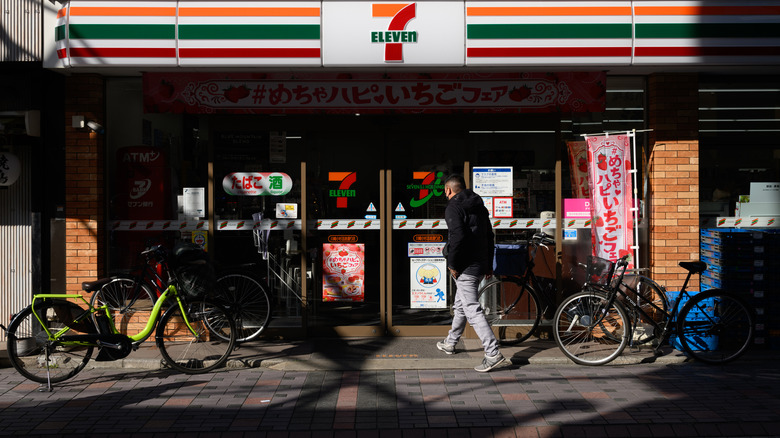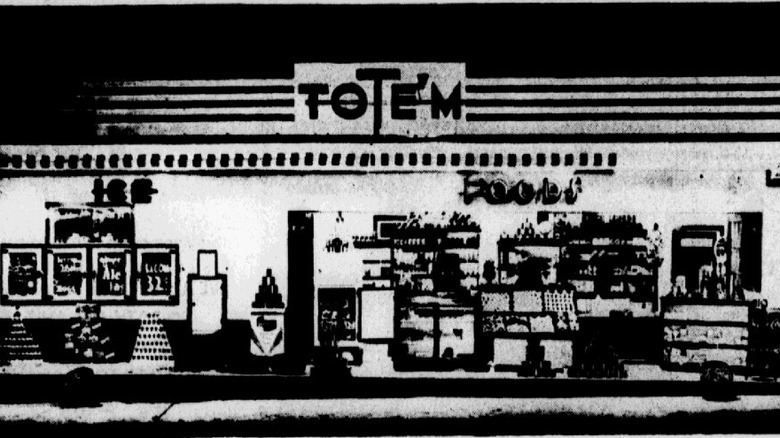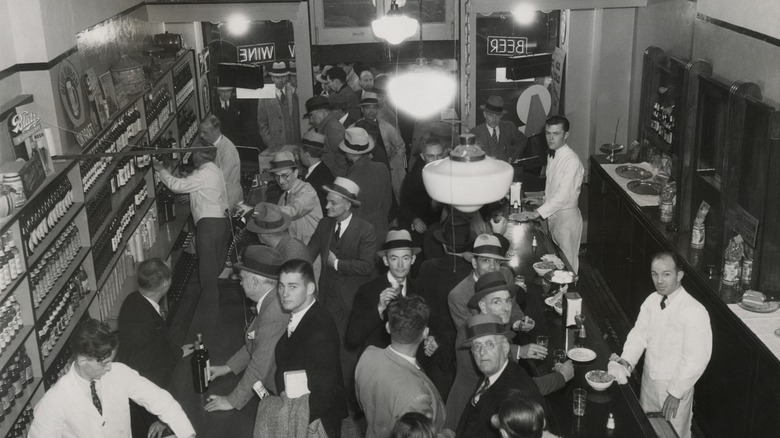The Post-Prohibition Resurrection Of 7-Eleven
What does 7-Eleven mean to you? It sounds like an odd question, but 7-Elevens look very different depending on where in the world you are. How'd you like to sit down for a meal and a concert? According to The New York Times, you can do just that at the 7-Elevens in Indonesia, which offer seating, free Wi-Fi, and live music. In Taiwan, you can pay utility bills, book a vacation, and buy an iPod at 7-Eleven. The government even lets you pay taxes and traffic tickets there. Insider adds that many Japanese 7-Elevens function as full-scale grocery stores with the added convenience of on-site fax machines. It seems like the only thing these establishments have in common is the name.
About that name ... why is it called 7-Eleven when the stores are open 24 hours? In recent years, the company has pointed to July 11 as its birthday, offering free Slurpees to celebrate. However, the name has nothing to do with any calendar date, and besides, that promotion pales in comparison to Bring Your Own Cup Day, when you can load up anything from a teapot to a fishbowl with the Slurpee of your choice. According to Reader's Digest, the name 7-Eleven dates back to 1946, and at that time, the stores actually were open from 7 a.m. to 11 p.m. That wasn't the true beginning of 7-Eleven though. The business dates back another 20 years, and it might not have survived to 1946 were it not for the impact of Prohibition.
7-Eleven began as an ice house
In the days before electric refrigerators, people relied on ice to preserve their food. Easy enough in the cold winter months, but not for the rest of the year, which is why ice houses became vital businesses. Per the Daily Mail, these were well-insulated buildings where large amounts of ice and refrigerated goods could be kept year-round. The seeds of 7-Eleven were planted in 1927 when four ice companies in Dallas, Texas merged to form the Southland Ice Company (via Reference for Business). To supplement the ice business, they began selling basic staples like milk, bread, and eggs, turning their stations into the very first convenience stores. As the business grew, it seemed that a new name was called for, but '7-Eleven' was still more than a decade away.
A breakthrough came when one of the Southland Ice Company executives took a vacation to Alaska. According to Mental Floss, he returned with a souvenir totem pole, which he placed in front of one of the convenience stores. This earned the business a new nickname: "the tote'm store." It had a double meaning, referring to both the totem pole out front and the fact that customers toted their purchases on the way out. The business was subsequently renamed "Tote'm," and each store was decorated with a faux-Inuit theme. Business was good, but then the Great Depression hit.
Repealing Prohibition saved 7-Eleven
The Depression dealt a major blow to the Tote'm brand. The Reference for Business reveals that Southland Ice went bankrupt in 1931. The company was placed into receivership and major changes were made to its leadership. A Dallas-based banker named W.W. Overton Jr. stepped in and organized the sale of all company bonds for the bargain price of seven cents on the dollar. This ultimately transferred ownership to a board of directors, who helped to stabilize the company's finances somewhat. However, the real saving grace came in 1933 when the United States government repealed Prohibition.
The Great Depression played a major role in ending Prohibition. According to History, when Prohibition was enacted, roughly a quarter of a million people employed by the alcohol industry lost their jobs. The government also lost approximately $11 billion in tax revenue over the course of Prohibition. In light of the Depression, these losses seemed all the more damaging, and anti-Prohibition activists began to argue that resuming alcohol sales would provide a major economic boost. This certainly proved true for the Southland Ice Company and its once-profitable Tote'm stores.
When Franklin D. Roosevelt and his Democratic cohorts took control of the government's executive and legislative branches, the 18th Amendment was repealed. Reader's Digest notes that Tote'm stores immediately seized the opportunity to sell booze, and a lot more ice to boot. The company's fortunes immediately changed for the better, propelling them towards their ultimate rebrand as 7-Eleven.


